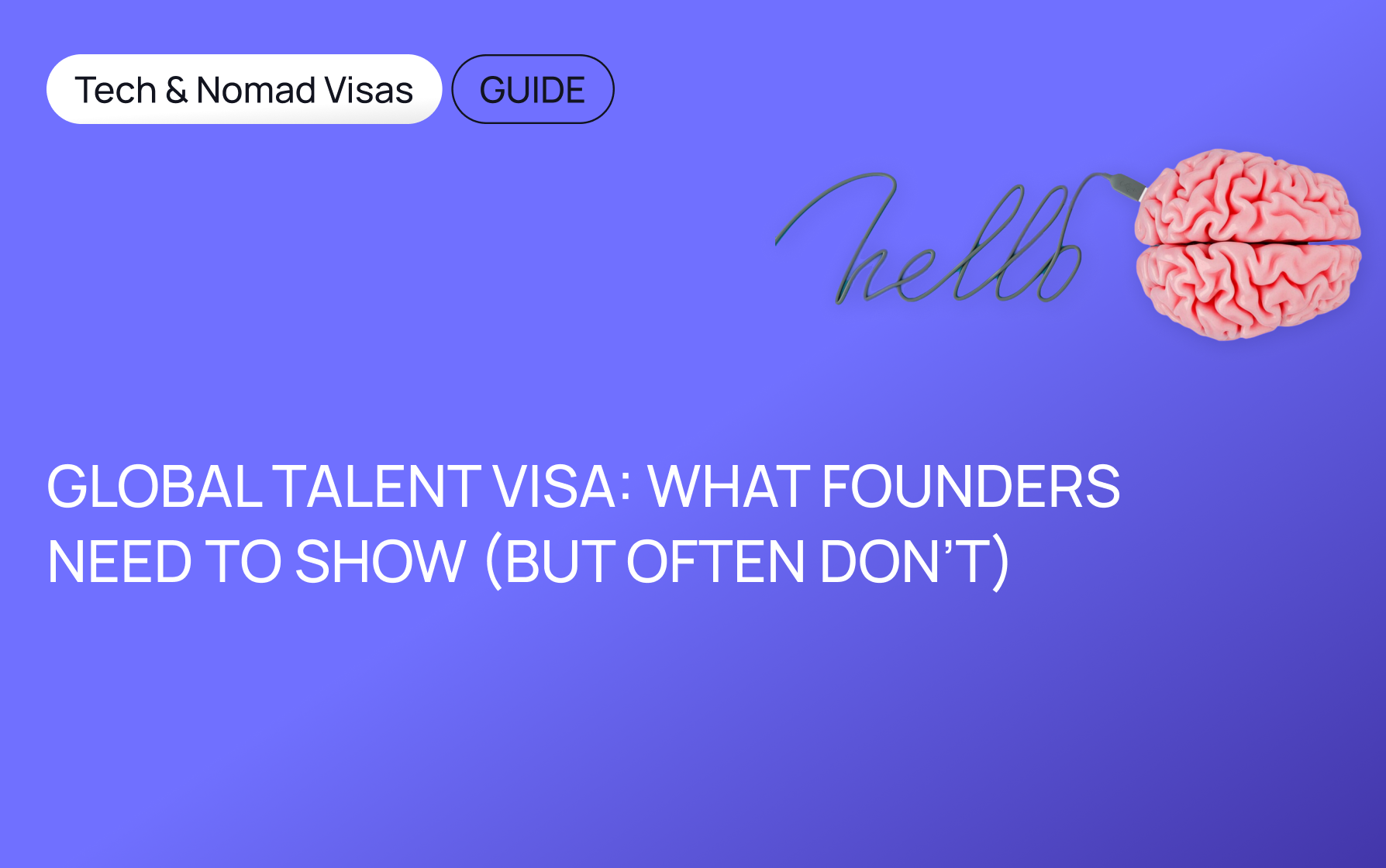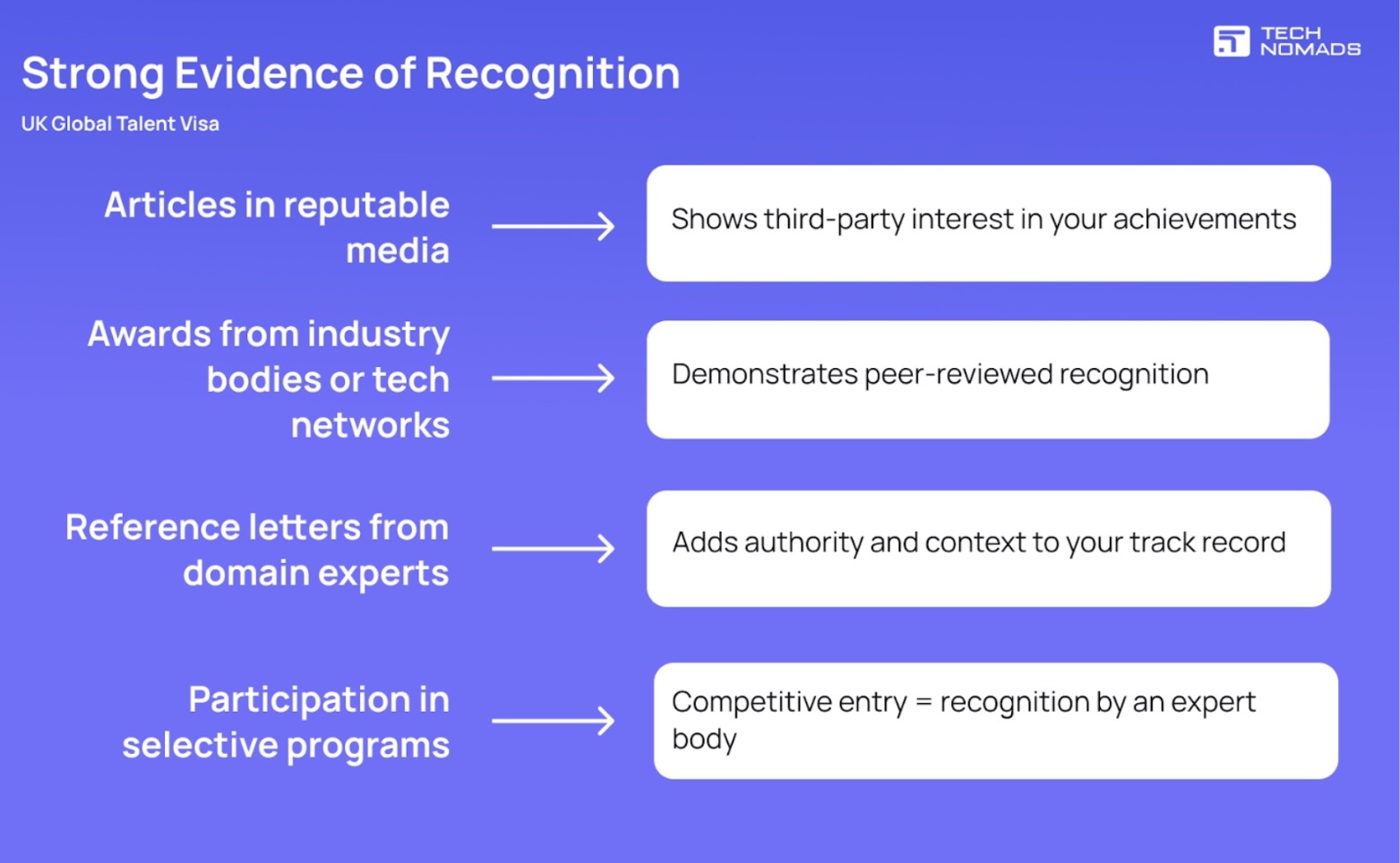
If you’re a startup founder with global ambitions, the Global Talent Visa might seem like the perfect pathway: designed for “exceptional talent,” open to entrepreneurs, and promising access to the world’s most innovative tech hubs — from the UK and Australia to Canada and beyond.
So why do so many promising founders still get rejected?
At Tech Nomads, we’ve worked with hundreds of talented individuals applying under this route. We’ve seen brilliant entrepreneurs with great products, impressive pitch decks, and strong teams — all come up short. Not because they lacked potential, but because they misunderstood what the visa demands.
Here’s the hard truth:
The result? Many founders submit the wrong kind of evidence, miss the key narratives, or treat the application like a LinkedIn profile instead of a legal case.
In this guide, we’ll walk you through the five biggest things founders need to show in a Global Talent Visa application — but often don’t. Think of it as a trusted checklist, shaped by real-world insight from guiding applicants through Tech Nation, The Australian National Innovation Visa (Subclass 858), Canada’s Start-up Visa, and more.
We’ll also share:
This is the stuff we wish every founder knew before submitting — or worse, giving up.
Ready? Let’s dive into the first (and most misunderstood) pillar: evidence of recognition.
*To gain more insights on Global Talent Visas and startup immigration, explore our previous articles:
Building A Strong Portfolio With Remote Work Achievements, Step By Step
What is Tech Nation: Catalyzing the UK's Tech Growth and Global Talent Attraction
Launching an AI Tech Startup in the UK: Visa Pathway & Step-by-Step Process
Skills Startup Founders Need To Succeed In 2025
One of the biggest myths founders believe is:
“If I’ve built something impressive, that’s all the proof I need.”
Unfortunately, visa assessors aren’t here to bet on your potential — they want to see evidence that the world already recognises your contribution to tech or innovation.
And this is where many applications fail.
Strong Evidence of Recognition:

Don’t panic if you don’t have media coverage or a Series A round yet. Many early-stage founders still succeed with:
At Tech Nomads, we often help founders shape early achievements into compelling evidence. It’s not just about what you’ve done — it’s about how you frame and connect the pieces.
The Leadership Trap: Are You the Driving Force?
You’ve founded a company. You’re the CEO. Maybe even the founder. That should be enough to prove you’re a leader… right?
Not quite.
In Global Talent Visa applications, leadership isn't about titles — it's about tangible influence, ownership, and direction. This is one of the most misunderstood parts of the process, and many excellent founders get stuck here.
Visa assessors aren’t looking at your company structure — they’re assessing whether you have played a key leadership role in innovation or impact. That means:
Here’s where founders often go wrong:
They assume that being listed as a co-founder or C-level executive on a website is self-evident proof of leadership. But without context, that’s just a label. Assessors need evidence that you’ve been actively steering the ship, not just standing on the deck.
Let’s say you submit:
On their own, these don’t answer the core question:
“Is this person truly responsible for key decisions and progress in this venture?”
Worse, they raise quite doubts.
At Tech Nomads, we often work with founders whose applications were initially rejected not because of weak achievements, but because the evidence didn’t clearly show they were the driving force.
Here’s how strong applicants prove they are central, not peripheral, to their company or field:
One powerful way to support this? A narrative summary. When working with Tech Nomads, founders often include a short, structured explanation of their leadership journey — not just what they did, but why it mattered, and what changed as a result.
It’s okay if your startup isn’t profitable yet. Or if you’ve pivoted. Or even shut down. What matters more is your ability to:
Many successful applicants have weathered failures — but they told the story honestly, insightfully, and with clear evidence of personal leadership.
If you’re unsure what qualifies as strong leadership evidence in your case, don’t leave it up to chance. The right framing can make or break your application — and it’s something we help clarify every day at Tech Nomads.
You’ve built something real. You have users. Maybe you’ve won an award, raised a small round, or landed a few strategic partnerships. That's an impact, right?
Yes — but only if you present it correctly.
This is where so many founders, especially in early-stage or lean startups, lose their footing. They mention traction and social proof in passing — a line about 10,000 downloads here, a brief sentence about seed funding there — but they don’t frame it in a way that proves their influence.
Think of it this way: visa assessors aren’t just skimming for numbers. They’re trying to understand what those numbers mean in the wider context of your field.
Endorsing bodies want to know:
Let’s break down a common mistake:
“We have 25,000 users.”
That sounds fine on the surface. But who are those users? How did you reach them? What behaviour are they showing? Are they active, paying, and influential?
Here’s a more persuasive version:
“Since launching our beta in March, we’ve reached 25,000 verified users across 18 countries, with 40% returning weekly. I led our growth strategy, including partnership development and onboarding campaigns.”
See the difference?
It’s no longer just a vanity metric — it’s a narrative of momentum, reach, and leadership.
Many founders assume endorsing bodies will “connect the dots” if they just list their achievements. But they won’t — because they can’t. They don’t know your industry the way you do.
That’s why you must connect the dots for them.
Here’s a before-and-after example:
Before: “Secured a government grant.”
After: “In 2023, our team was awarded a £50,000 Innovate UK grant for AI-driven climate risk modelling — selected among 2,300 applicants. I authored the proposal and led the technical roadmap.”
Before: “Spoke at a startup event.”
After: “Invited as a keynote speaker at Women in AI 2024 (1,500+ attendees), where I presented our machine learning approach to ethical data modelling.”
The goal is always the same: anchor your impact in specificity, context, and your contribution.
Social proof is another area where founders often under-deliver.
You might think “being featured” or “having followers” is enough. But unless you clearly explain why those things matter, assessors may not see the value.
For example:
Better still, combine social proof with outcomes.
It’s worth noting: if you’re pre-revenue or in a non-commercial space (e.g., open source, research, social tech), you can still show impact.
Think:
Traction isn’t only about money. It’s about showing you’re making things move in your area — and that you’re doing it intentionally, visibly, and as a leader.
What We Wish Every Founder Knew Before Submitting
By this point, you already understand the big themes: recognition, leadership, impact, and storytelling. But sometimes, even when the main pieces are in place, founders still get rejected — often for reasons that feel unfair or just unclear.
At Tech Nomads, we've reviewed hundreds of feedback letters from rejected applicants across different talent pathways — including the UK, Australia, Canada, and the UAE. While the wording may vary, the underlying messages repeat.
Here’s what we’ve learned — and what you can avoid.
One of the most common mistakes is submitting a pile of links, screenshots, and PDFs with no clear narrative.
You may have:
...but endorsing bodies aren't going to piece these together for you. Too much unstructured evidence can hurt your case. It signals a lack of focus — or worse, overcompensation.
Instead:
You usually need 2–3 letters of recommendation from leaders in your field. These are critical, but they’re also frequently weak because:
Here’s how to get it right:
“Of the 50 founders I’ve worked with in my career, they stand out for…”
Make sure they add contact details, titles, and a brief bio or context about their expertise.
Tech Nomads regularly supports founders by guiding their recommenders through this — offering templates, examples, and even reviewing drafts to ensure they truly reinforce the applicant’s strengths.
You might feel tempted to use phrases like:
These are fine — if you can back them up with evidence. If not, they can make your application feel inflated.
Remember: assessors aren’t investors. They aren’t emotionally moved by hype. They are trained to ask:
“Where is the proof?”
So if you use strong language, make sure it’s followed by:
Founders are busy. We get it.
But many come to us after having already submitted — and been rejected — simply because they underestimated the process.
Indeed, visa assessors aren’t looking for perfection. But they are looking for maturity, clarity, and depth.
Taking the time to:
...can mean the difference between a smooth approval and a six-month setback.
And if you’re unsure whether your application is ready, there’s no shame in asking for a second set of eyes. At Tech Nomads, we regularly offer pre-submission reviews or full application support — depending on how far along you are.
Your application is more than paperwork — it’s a reflection of your journey, your vision, and your growth as a founder.
And sometimes, the best way to prove you belong on the global stage is to step back, zoom out, and reframe your story with intention.
There’s no perfect formula. But there is a strategy — and with the right tools, structure, and support, you’ll have everything you need to make your case count.
At Tech Nomads, we offer tailored support to help founders navigate the UK visa process with confidence — from choosing the right route to building a strong application, step by step.
Tech Nomads is a global mobility platform that provides services for international relocation. Established in 2018, Tech Nomads has a track record of successfully relocating talents and teams. Our expertise in adapting to regulatory changes ensures our clients’ satisfaction and success.
Tech Nomads Club is a curated global community for highly skilled professionals.
We host free, application-based events including expert panel talks, start-up pitch days, members-only networking, informal meetups, and fireside conversations with industry leaders.
Membership is free but selective — open to those building across borders and seeking meaningful growth through connection, knowledge, and community.
We also produce a regular podcast, sharing real stories, insights, and voices from inside the Club.
To explore your UK relocation options, you may:
Subscribe to our social media platforms to stay up-to-date on global mobility news and opportunities: